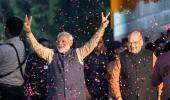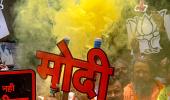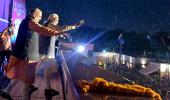Khalid Saifullah created Missing Voters, an app which enables people to conveniently apply for voter cards.
Geetanjali Krishna reports.

The Election Commission of India estimates that about 84 million voters participated in the country's chaotic dance of democracy for the first time during the 2019 Lok Sabha elections.
Many of these voters only recently became eligible to vote.
It took a techie from Hyderabad to generate awareness about others, who for different reasons were eligible to vote -- but have simply never voted.
Meet Khalid Saifullah, the engineer who has used data in the public domain to easily identify disenfranchised individuals, and created Missing Voters -- an app which enables such people to conveniently apply for voter cards.
In the three months that it was operational, the app has been downloaded over 200,000 times by users across the country from Kashmir to Assam.
"We've been instrumental in filing about 72,000 voter ID applications in three months," says Saifullah.
"Almost 70 per cent were successful and voted this year!"
Here's how the idea of the Missing Voters app originated.
"My original idea was to use electoral data from 2014 to identify people eligible for old age and widow pension schemes," Saifullah says.
"The data indicated that many such individuals weren't receiving their entitlements."
In the process, he stumbled across an interesting anomaly: "The data showed that 12 to 20 per cent households had only one voter," says Saifullah.
"This didn't tally with the 2011 census data which reported that single-member households were only four per cent of the total."
An initial fact-finding mission in 10 assembly constituencies revealed unregistered but eligible adults in almost every one of these households.
Saifullah also discovered there was a disproportionately high number of Muslims and Dalits among these 'missing voters'.
Dedicated volunteers visited single voter households in about 1,000 assembly constituencies.
Wherever they found unregistered voters, they uploaded their address proof, age proof, guardian's name and passport size photograph on the app.
"Our back-end team of about 150 students used the data to fill the online enrolment form on the Election Commission Web site," says Saifullah.
For each completed application, the back-end team member earned Rs 10.
Once the application had been filed, the app digitally tracked it until the voter card was issued.
The process might seem labour-intensive, cumbersome even, but it worked.
"I've learnt that to truly benefit the needy in India, you have to reach their doorstep," Saifullah says.
He is confident that before the next Lok Sabha elections, they would be able to reach all the assembly constituencies in the country.
"It costs about Rs 5,000 for us to cover one constituency," he says.
So far, they have worked with institutional donors like the Centre for Research and Debates in Development Policy and the Zakat Foundation.
They have also developed a network of execution partners including the People's Union for Civil Liberties and the Ambedkar International Mission.
"We plan to reach all of India's assembly constituencies," says Saifullah, "and I also want to go back to my original plan of identifying widows and elderly people eligible for government pension from the database."
As he and his band of volunteers work the statistics to identify stories of exclusion, one thing is clear: To scale social security schemes in a country the size of India, perhaps Saifullah's unique brand of data crunching could be the way forward.
Kindly note that the image has been posted only for representational purposes.
You can download the Missing Voters app at missingvoters.in











